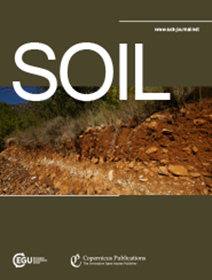利用奥地利和瑞典的长期田间试验,评估农业生态系统中不同管理方法的茶包指数方法
IF 5.8
2区 农林科学
Q1 SOIL SCIENCE
引用次数: 0
摘要
摘要垃圾分解是影响当地和全球碳循环的一个重要因素。众所周知,生态系统中通过土壤微生物活动进行的分解主要受土壤类型和气候条件的影响。然而,对于农业生态系统来说,仍然需要更好地了解管理方法如何影响垃圾的分解。本研究采用 Keuskamp 等人(2013 年)开发的茶袋指数(TBI)方案,在 29 个地点进行了长期(平均持续时间为 38 年)现场实验(LTE),考察了不同管理方法对腐烂的影响。目的是确定茶袋指数分解率(k)和稳定因子(S)是否足够灵敏,以检测不同管理方法下垃圾分解的差异,以及它们如何与环境因素、作物类型和当地气候条件相互作用。在奥地利的 16 个地点和瑞典的 13 个地点埋设茶叶袋,并在 90 天后收集茶叶袋。奥地利长效试验的处理侧重于矿物肥料和有机肥料的施用、耕作制度和作物残留物管理,而瑞典的处理侧重于耕作制度、矿物肥料的施用和耕作制度。奥地利的研究结果表明,与清除作物秸秆、低氮或不氮施肥相比,作物秸秆沤肥和高氮施肥分别增加了 k。与减少耕作和传统耕作相比,少耕的 K 值明显更高。在瑞典,施肥地块的 S 值高于非施肥地块,高氮肥的 k 值最高。对奥地利和瑞典的随机森林回归共同表明,k 和 S 主要受气候条件的影响,气候条件解释了其 70% 以上的变化。然而,在相似的气候条件下,管理方法对分解动态有很大影响。为了提高该指数作为管理措施对废弃物分解动态影响的指标的实用性,尤其是将其与碳储存潜力联系起来,最好能将 TBI 方法应用到使用农业生态系统 LTE 的更大规模的网络中。本文章由计算机程序翻译,如有差异,请以英文原文为准。
Evaluating the Tea Bag Index approach for different management practices in agroecosystems using long-term field experiments in Austria and Sweden
Abstract. Litter decomposition is an important factor affecting local and global C cycles. It is known that decomposition through soil microbial activity in ecosystems is mainly influenced by soil type and climatic conditions. However, for agroecosystems, there remains a need for a better understanding of how management practices influence litter decomposition. This study examined the effect of different management practices on decomposition at 29 sites with long-term (mean duration of 38 years) field experiments (LTEs) using the Tea Bag Index (TBI) protocol with standard litter (rooibos and green tea) developed by Keuskamp et al. (2013). The objective was to determine if the TBI decomposition rate (k) and stabilization factor (S) are sensitive enough to detect differences in litter decomposition between management practices as well as how they interact with edaphic factors, crop type and local climatic conditions. Tea bags were buried and collected after ∼90 d at 16 Austrian and 13 Swedish sites. The treatments in the Austrian LTEs focused on mineral and organic fertilizer application, tillage systems and crop residue management, whereas those in Sweden addressed cropping systems, mineral fertilizer application and tillage systems. The results for Austria showed that the incorporation of crop residue and high-N fertilizer application increased k, compared with crop residue removal and low or no N application, respectively. Minimum tillage had significantly higher k compared with reduced and conventional tillage. In Sweden, fertilized plots showed higher S than non-fertilized plots and high-N fertilizer had the highest k. Growing spring cereal led to higher k than forage crops. Random forest regressions for Austria and Sweden jointly showed that k and S were mainly governed by climatic conditions, which explained more than 70 % of their variation. However, under similar climatic conditions, management practices strongly influenced decomposition dynamics. It would be appropriate to apply the TBI approach to a more large-scale network using LTEs for agroecosystems, in order to improve the index's usefulness as an indicator of the effect of management practices on litter decomposition dynamics, particularly linking it with the potential for C storage.
求助全文
通过发布文献求助,成功后即可免费获取论文全文。
去求助
来源期刊

Soil
Agricultural and Biological Sciences-Soil Science
CiteScore
10.80
自引率
2.90%
发文量
44
审稿时长
30 weeks
期刊介绍:
SOIL is an international scientific journal dedicated to the publication and discussion of high-quality research in the field of soil system sciences.
SOIL is at the interface between the atmosphere, lithosphere, hydrosphere, and biosphere. SOIL publishes scientific research that contributes to understanding the soil system and its interaction with humans and the entire Earth system. The scope of the journal includes all topics that fall within the study of soil science as a discipline, with an emphasis on studies that integrate soil science with other sciences (hydrology, agronomy, socio-economics, health sciences, atmospheric sciences, etc.).
 求助内容:
求助内容: 应助结果提醒方式:
应助结果提醒方式:


